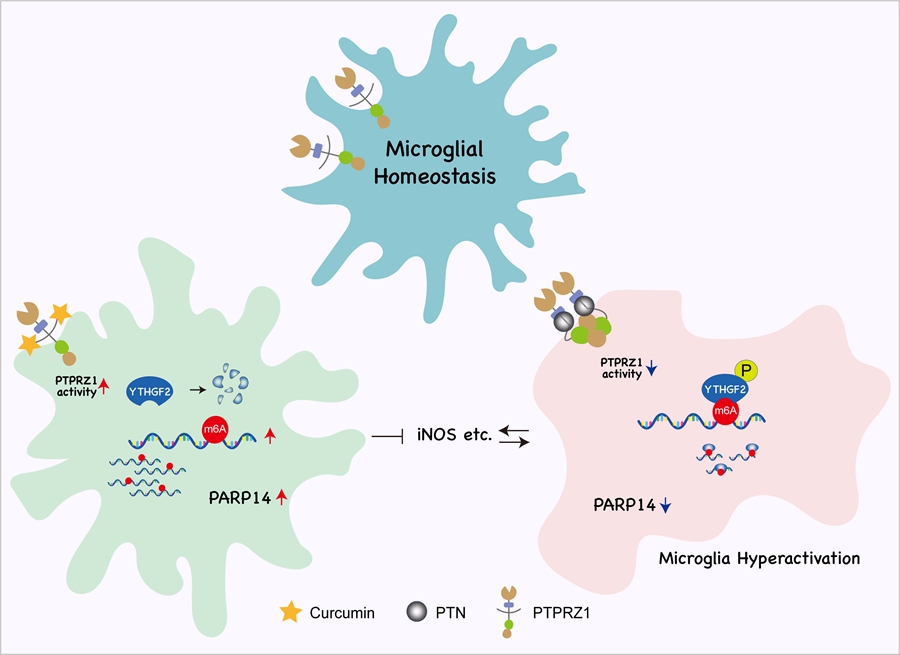Epilepsy is a severe neurological disorder characterized by recurrent seizures that not only lead to neuronal damage but also trigger widespread activation of glial cells in the brain. This activation initiates a local immune response, releasing pro-inflammatory factors that further exacerbate the condition, forming a vicious cycle. Traditional Chinese medicine (TCM) has long utilized Baijin Pills for epilepsy treatment. Among its key ingredients, Curcuma aromatica (Yujin) contains curcumin, a bioactive compound that has recently been found to potentially mitigate epileptic seizures by modulating the balance of the central nervous system microenvironment. However, the precise molecular mechanisms underlying curcumin’s regulation of neuroinflammation, including its specific targets, remain largely unclear.
Recently, a collaborative study published in Advanced Science (DOI:10.1002/advs.202405263) which was led by MENG Wenxiang’s team at the Institute of Genetics and Developmental Biology, Chinese Academy of Sciences, and XIE Qi’s team at Wangjing Hospital, China Academy of Chinese Medical Sciences, reveals the crucial role of curcumin in regulating neuroinflammation after epileptic seizures and its underlying molecular mechanisms, providing new scientific evidence for the clinical application of curcumin.
The researchers found that curcumin modulates protein tyrosine phosphatase receptor type Z1 (PTPRZ1), suppressing excessive neuroinflammatory responses, reducing brain damage following seizures, and promoting neuronal repair. These findings enhance our understanding of curcumin’s pharmacological effects and identify new therapeutic targets and strategies for neurological disorders.
The discovery of effective formulations, the elucidation of scientific mechanisms, and the expansion of clinical applications are the core goals of modern TCM research. Curcumin is widely found in Curcuma aromatica (Yujin), Curcuma longa (Jianghuang), and Curcuma phaeocaulis (E Zhu) - traditional medicinal herbs that have been used for centuries across China and other Asian countries to treat various ailments. The biological activity and pharmacological effects of curcumin have attracted widespread attention.
This study not only deepens our understanding of the mechanism of action of curcumin, a key bioactive component of TCM, but also provides new insights and directions for the precise treatment of neurological diseases using TCM.
The study was funded by the Major Research Projects of the China Academy of Chinese Medical Sciences Innovation Program and the Beijing Traditional Chinese Medicine Science and Technology Development Fund.
Figure. Diagram of curcumin maintaining microglial homeostasis (Image by IGDB)
Contact:
Dr. MENG Wenxiang
Institute of Genetics and Developmental Biology, Chinese Academy of Sciences
Email: wxmeng@genetics.ac.cn
 Figure. Diagram of curcumin maintaining microglial homeostasis (Image by IGDB)Contact:Dr. MENG WenxiangInstitute of Genetics and Developmental Biology, Chinese Academy of SciencesEmail: wxmeng@genetics.ac.cn
Figure. Diagram of curcumin maintaining microglial homeostasis (Image by IGDB)Contact:Dr. MENG WenxiangInstitute of Genetics and Developmental Biology, Chinese Academy of SciencesEmail: wxmeng@genetics.ac.cn CAS
CAS
 中文
中文




.png)
